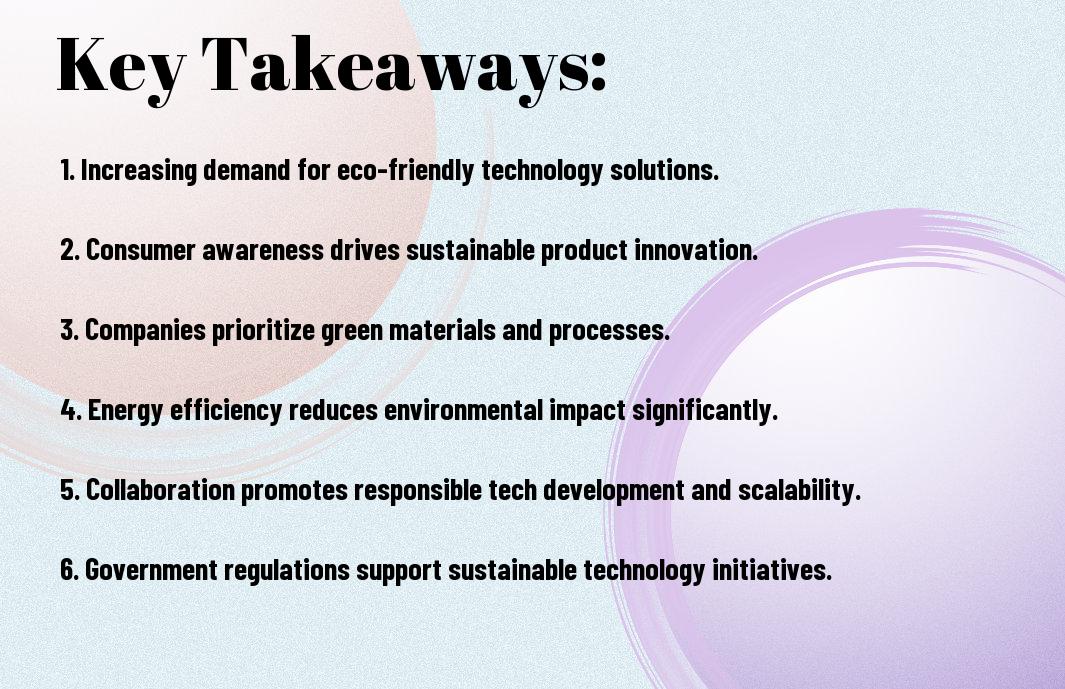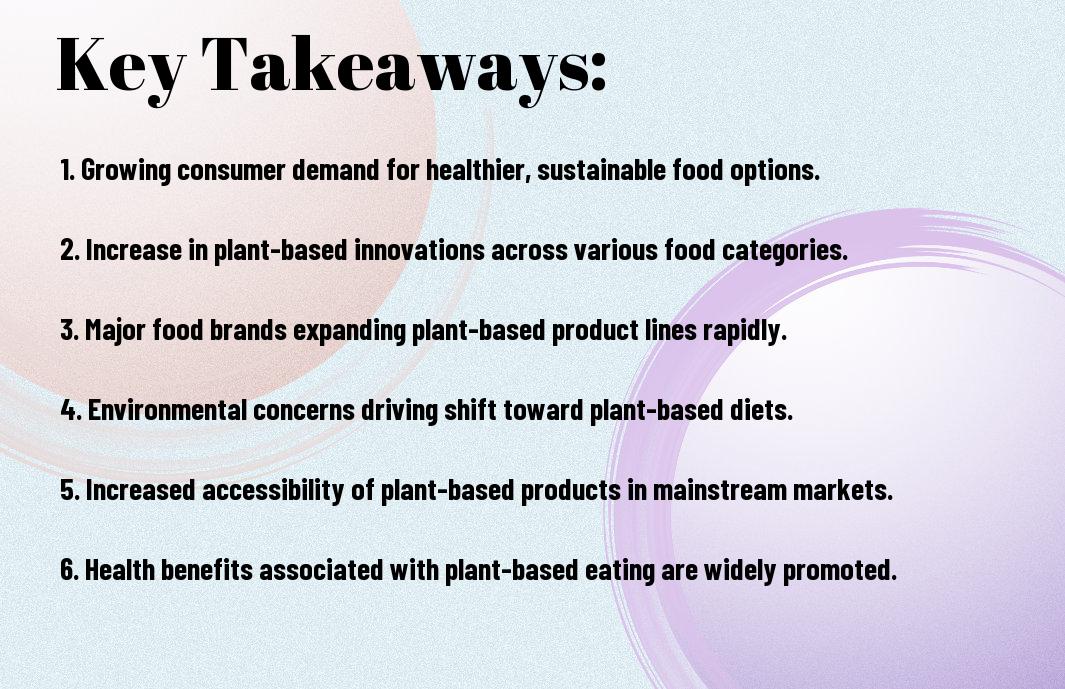As you consider your next tech purchase, you’re likely thinking about more than just features and price. You’re probably wondering about the environmental impact of your decision. Your concerns are well-founded, as the production and disposal of tech products have significant effects on the planet. You’re not alone in seeking sustainable options, and fortunately, the tech industry is responding with innovative, eco-friendly solutions that benefit both you and the environment.
Key Takeaways:
To understand the significance of sustainable tech products, consider the following points:
- The development of eco-friendly devices and green technology is driving the growth of the sustainable tech industry, as consumers become more aware of the environmental impact of their purchases.
- The integration of renewable energy sources and energy-efficient designs in tech products is reducing carbon footprints and promoting sustainable development in the tech sector.
- The increasing demand for sustainable tech products is also driving innovation, with companies investing in research and development to create products that are both environmentally sustainable and economically viable.

The Shift Towards Eco-Friendly Gadgets
Before making a purchase, you can consider the environmental impact of your gadgets, and as you explore the market, you’ll find more options that align with your values, such as learning more about Sustainable Technology: Redefining the Future of Digital Hardware, which can help you make informed decisions.
Benefits of Sustainable Materials
At the forefront of sustainable tech, you’ll find innovative materials that not only reduce waste but also provide a more efficient user experience, allowing you to enjoy your gadgets while minimizing your environmental footprint.
Reduced Electronic Waste
Before disposing of your old devices, you should consider the potential consequences of electronic waste, and as you investigate deeper, you’ll discover the importance of responsible disposal methods.
Understanding the impact of electronic waste on the environment, you can take steps to reduce your contribution by choosing gadgets with sustainable materials, buying second-hand devices, or participating in recycling programs, which can significantly minimize the amount of waste ending up in landfills and polluting your planet.

Energy Efficiency in Smart Devices
Any modern smart device you purchase today is designed with energy efficiency in mind, allowing you to enjoy your favorite products while minimizing your environmental impact.
Advances in Renewable Energy Sources
Albeit slowly, alongside the growth of sustainable tech, you’re seeing advancements in renewable energy sources that power your devices, reducing your reliance on non-renewable energy sources.
Power-Saving Technologies
Along with the development of sustainable tech, you’re benefiting from power-saving technologies that help reduce your device’s energy consumption, making your devices more efficient and eco-friendly.
Smart technology is continually evolving to help you conserve energy, and with power-saving technologies, you can enjoy extended battery life and reduced energy bills, making your devices more cost-effective and sustainable for your daily use.
Innovative Designs for a Greener Future
Despite the growing demand for tech products, you can contribute to a more sustainable future by embracing innovative designs. You will find that many companies are now focusing on eco-friendly products, and you can be a part of this movement by choosing sustainable options.
Biodegradable Products
Across the globe, you will notice a shift towards biodegradable products that reduce electronic waste. You can opt for products made from bioplastics, which are compostable and non-toxic, making them a great alternative to traditional plastics.
Modular and Recyclable Designs
On the other hand, you can also consider modular and recyclable designs that allow you to upgrade or replace individual components, reducing waste and the need for new devices. You can take advantage of these designs to minimize your environmental footprint.
Consequently, as you explore modular and recyclable designs, you will find that they offer numerous benefits, including cost savings and extended product life. You can enjoy the latest technology while doing your part for the environment, and you will be surprised at how easily you can make a positive impact by choosing sustainable tech products.
The Role of Artificial Intelligence in Sustainability
Many innovative technologies are being developed to support sustainability, and artificial intelligence (AI) plays a significant role in this effort. You can expect AI to optimize processes, predict energy consumption, and improve your overall sustainability. As you explore the potential of AI, you’ll find that it can help you make more informed decisions about your energy usage and reduce your environmental impact.
AI-Powered Energy Management
Alike other technologies, AI-powered energy management systems are being developed to help you manage your energy consumption more efficiently. You can use these systems to monitor your energy usage, identify areas of waste, and optimize your energy consumption to minimize your environmental footprint.
Smart Home Automation
Above all, smart home automation is an area where AI can have a significant impact on your sustainability. You can use smart home devices to control your lighting, thermostat, and other systems, making it easier to manage your energy consumption and reduce waste.
Home automation systems can be integrated with your daily routine, allowing you to automate tasks and optimize your energy usage. You can set up your system to turn off lights and appliances when not in use, and adjust your thermostat to use less energy when you’re not home, helping you to reduce your energy consumption and lower your environmental impact.
Consumer Adoption and Market Trends
For a long time, you have been witnessing a significant shift in consumer behavior, driving the demand for sustainable tech products. As you explore the market, you notice a growing interest in eco-friendly technologies, influencing your purchasing decisions.
Growing Demand for Eco-Friendly Products
Besides the environmental benefits, you are also drawn to the cost-effectiveness and innovative features of sustainable tech products, making them a desirable choice for your daily needs.
Impact on the Tech Industry
Beneath the surface of this trend, you will find that the tech industry is experiencing a significant transformation, as companies adapt to meet your growing demand for sustainable products, changing the way they design, manufacture, and market their offerings.
EcoFriendly technologies are becoming increasingly important to you, and as you continue to prioritize sustainability, the tech industry is responding by investing in research and development, creating new products and services that not only reduce environmental impact but also provide you with innovative solutions that enhance your daily life, making it easier for you to make sustainable choices that align with your values.
Challenges and Limitations
To develop sustainable tech products, you face several obstacles that can hinder your progress, including high production costs and performance trade-offs, which can impact your ability to create environmentally friendly products.
High Production Costs
Limiting factors such as expensive materials and manufacturing processes can increase costs, making sustainable tech products less competitive in the market, and you need to consider these factors when designing your products.
Balancing Sustainability with Performance
Below the surface of sustainable tech products lies a complex trade-off between eco-friendliness and performance, and you must navigate this balance to create products that meet your customers’ expectations while minimizing environmental impact.
Production of sustainable tech products requires you to weigh the environmental benefits of using recycled materials or energy-efficient designs against the potential impact on product performance, and you must consider how your design choices will affect your customers’ user experience, as they expect your products to be both sustainable and functional, so you need to find a balance that meets both requirements.
Final Words
Conclusively, as you explore the rise of sustainable tech products, you will notice a significant shift in your approach to technology. You will find that your choices have a direct impact on the environment, and your decisions will shape the future of the industry. By embracing eco-friendly options, you are contributing to a more sustainable world, and your actions will inspire others to follow your lead.
FAQ
Q: What is driving the growth of sustainable tech products in the market?
A: The growth of sustainable tech products is driven by increasing consumer awareness about the environmental impact of their purchasing decisions, coupled with advancements in technology that enable the creation of eco-friendly products without compromising on performance. Governments and organizations are also implementing regulations and initiatives that promote sustainability, further fueling the demand for sustainable tech products.
Q: How do sustainable tech products differ from traditional tech products in terms of design and manufacturing?
A: Sustainable tech products are designed with the environment in mind, incorporating recycled materials, bioplastics, and energy-efficient components. The manufacturing process also prioritizes minimal waste generation, reduced carbon footprint, and the use of renewable energy sources. Additionally, sustainable tech products are often designed for longevity, recyclability, and upgradability, reducing electronic waste and the continuous demand for new devices.
Q: What role do consumers play in promoting the adoption of sustainable tech products?
A: Consumers play a significant role in driving the demand for sustainable tech products by making informed purchasing decisions. By choosing products with environmentally friendly features, materials, and packaging, consumers send a signal to manufacturers to prioritize sustainability. Moreover, consumers can also contribute to the sustainability of tech products by adopting practices such as buying refurbished or second-hand devices, recycling old electronics, and supporting companies that prioritize sustainability in their operations.
Q: Are sustainable tech products more expensive than traditional tech products?
A: While some sustainable tech products may be priced higher than their traditional counterparts, this is not always the case. As the demand for sustainable tech products grows, economies of scale are achieved, and manufacturing costs decrease, making sustainable options more competitive. Furthermore, the long-term benefits of sustainable tech products, such as energy efficiency and reduced electronic waste, can lead to cost savings over time, offsetting any initial higher costs.
Q: How can businesses and individuals measure the environmental impact of their tech products and make more sustainable choices?
A: Businesses and individuals can measure the environmental impact of their tech products by assessing factors such as energy consumption, material usage, and end-of-life recyclability. Tools like carbon footprint calculators, life cycle assessments, and environmental certification programs (e.g., Energy Star, EPEAT) can provide valuable insights. Additionally, opting for products with environmentally friendly certifications, buying from sustainable manufacturers, and prioritizing device longevity can help make more sustainable choices, contributing to a reduced environmental footprint.

